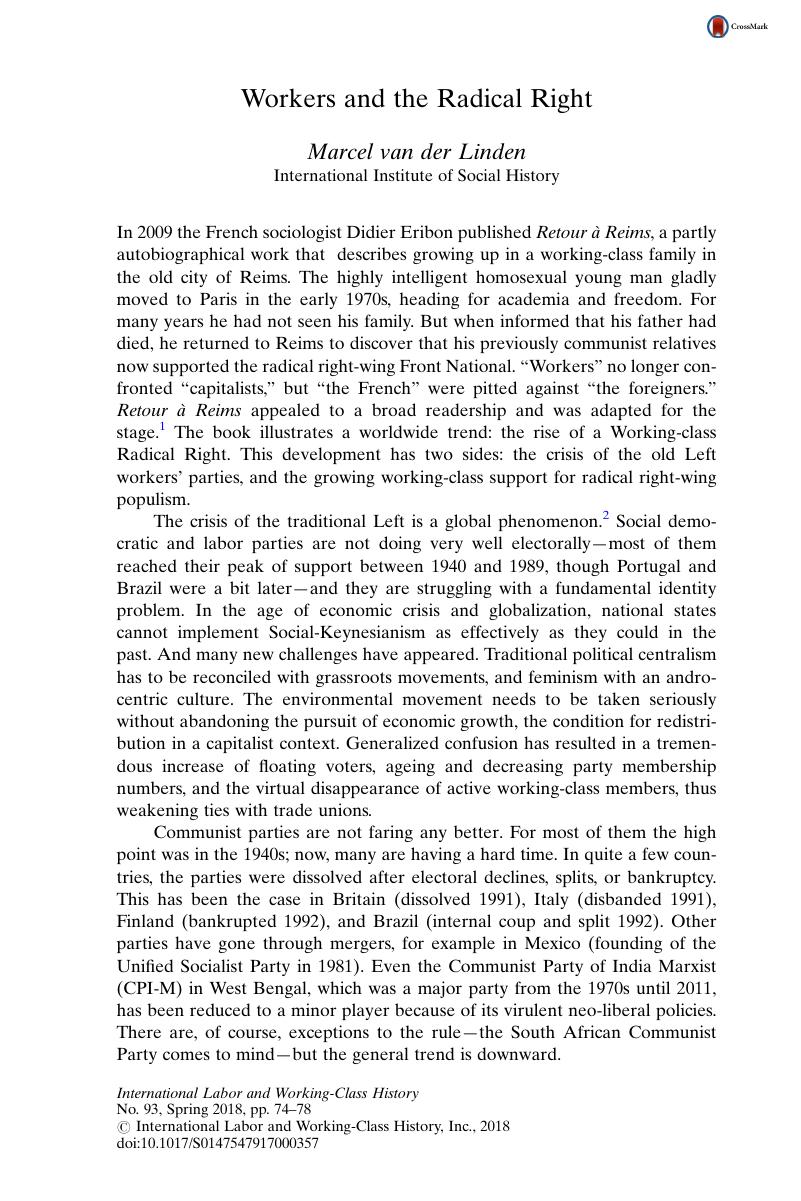Published online by Cambridge University Press: 03 May 2018

1. Published in English as Returning to Reims. Introd. Chauncey, George, trans. Lucey, Michael (Cambridge, MA: MIT Press, 2013)Google Scholar.
2. This paragraph and the following are based on van der Linden, Marcel, “Global Labour: A Not-so-grand Finale and Perhaps a New Beginning,” Global Labour Journal 7:2 (2016): 201–10Google Scholar.
3. Betz, Hans-Georg, Radical Right-Wing Populism in Western Europe (New York: St. Martin's Press, 1994), 4CrossRefGoogle Scholar.
4. Oesch, Daniel, “Explaining Workers’ Support for Right-Wing Populist Parties in Western Europe: Evidence from Austria, Belgium, France, Norway, and Switzerland,” International Political Science Review 29:3 (2008): 349–73CrossRefGoogle Scholar, at 349–50. See also Lubbers, Marcel, Gijsberts, Mérove, and Scheepers, Peer (2002). “Extreme Right-Wing Voting in Western Europe,” European Journal of Political Research 41 (2002): 345–78CrossRefGoogle Scholar.
5. The extent to which Donald Trump has received working-class support is, of course, contested. But even scholars who believe that the shift has often been exaggerated have had to admit that important sections of the working class voted Republican. See, e.g., Davis, Mike, “The Great God Trump & the White Working Class,” Catalyst 1:1 (Spring 2017): 151–71Google Scholar.
6. Bhattacharya, Sabyasachi, “Introduction,” in The Vernacularization of Labour Politics, eds. Bhattacharya, and Behal, Rana P. (New Delhi: Tulika, 2016), 2Google Scholar.
7. Falter, Jürgen W., Hitlers Wähler (Munich: C.H. Beck, 1991)Google Scholar. A useful publication in English is Fischer, Conan (ed.), The Rise of National Socialism and the Working Classes in Weimar Germany (Oxford and Providence: Berg, 1996)Google Scholar.
8. See, e.g., the massive volume Larsen, Stein Ugelvik et al. , Who Were the Fascists. Social Roots of European Fascism (Bergen: Universitetsforlaget, 1980)Google Scholar.
9. Hanna Schwander and Philip Manow, It's Not the Economy, Stupid! Explaining the Electoral Success of the German Right-wing Populist AfD. Center for Comparative and International Studies, Working Paper No. 94 (Zürich: ETH Zürich/University of Zürich, 2017).
10. I have borrowed the first five points from Gidron, Noam and Hall, Peter A., “The Politics of Social Status: Economic and Cultural Roots of the Populist Right,” British Journal of Sociology 68:Supplement 1 (2017): S57–84Google ScholarPubMed.
11. Paul Collier, “The Importance of Belonging,” International Politics and Society (2017) [Friedrich-Ebert-Stiftung], available at http://www.ips-journal.eu/in-focus/they-dont-care-about-us/article/show/the-importance-of-belonging-2416/ (accessed 17 February 2018).
12. An instructive Hungarian case study is Bartha, Eszter, “‘Would You Call the Capitalists Back?’ Workers and the Beginning of Market Socialism in Hungary,” Social History 34:2 (2009): 123–44CrossRefGoogle Scholar.
13. McQuarrie, Michael, “The Revolt of the Rust Belt: Place and Politics in the Age of Anger,” British Journal of Sociology 68:Supplement 1 (2017): S120–52Google ScholarPubMed, at S144.
14. Wallerstein, Immanuel, “How Do We Know Class Struggle When We See It? Reply to Ira Gerstein,” The Insurgent Sociologist 7:2 (1977): 104–6Google Scholar, at 105.